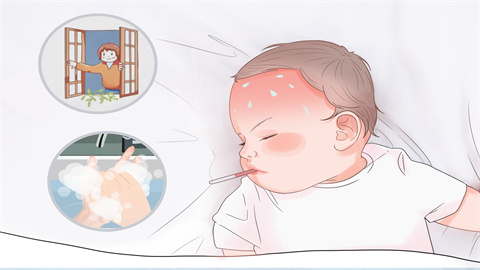How to manage a baby's hot palms and soles accompanied by low-grade fever
Generally, a baby's warm palms and soles accompanied by a low-grade fever may be caused by factors such as high environmental temperature, excessive physical activity, upper respiratory tract infection, urinary tract infection, pneumonia, and so on. Treatment options include general care and medication under a doctor's guidance. Detailed explanations are as follows:

1. High environmental temperature
Babies' body temperature regulation systems are not yet fully developed. When the surrounding environmental temperature is high, the body has difficulty dissipating heat, which can cause warm palms and soles along with a low-grade fever. It is important to maintain a suitable indoor temperature and avoid exposing the baby to high temperatures.
2. Excessive physical activity
When babies are physically active, their metabolic rate increases, generating more body heat. Because the palms and soles have abundant blood vessels, after activity, blood circulation accelerates, concentrating heat dissipation in these areas, which may lead to warm palms and soles accompanied by a low-grade fever. It is recommended to manage the baby's activity level reasonably and avoid excessive exertion.
3. Upper respiratory tract infection
An upper respiratory tract infection occurs when viruses or bacteria multiply extensively in the respiratory tract, irritating the respiratory mucosa and triggering an inflammatory response. This inflammation stimulates the body's immune system, leading to dysfunction of the body temperature regulation center, causing the above symptoms, and may also be accompanied by symptoms such as runny nose and nasal congestion. Under a doctor's guidance, medications such as ribavirin granules, ibuprofen suspension, and pediatric cough syrup may be used for treatment.
4. Urinary tract infection
Urinary tract infections are mainly caused by bacteria entering the urethra, bladder, ureter, and even kidneys through the urethral opening in a retrograde manner. These infections are often triggered by poor personal hygiene or a weakened immune system. Bacterial proliferation in the urinary system can cause an inflammatory response, possibly leading to warm palms and soles and a low-grade fever. Patients may also experience symptoms such as frequent urination and urgency. Under a doctor's advice, patients may use medications such as amoxicillin-clavulanate potassium dry suspension, levofloxacin tablets, and nitrofurantoin enteric-coated tablets for treatment.
5. Pneumonia
Pneumonia occurs when pathogens multiply extensively in the lung tissue, causing an inflammatory response. Under the stimulation of inflammation, the body's metabolism may become disordered, increasing heat production, which causes the baby's palms and soles to feel warm along with a low-grade fever, accompanied by symptoms such as coughing and sputum production. Patients may follow medical advice to use medications such as cefixime granules, dextromethorphan hydrobromide syrup, and azithromycin dry suspension for treatment.
Maintain good indoor air circulation by regularly opening windows for ventilation. Pay attention to the baby's personal hygiene, encourage frequent handwashing, and avoid contact with infection sources.





